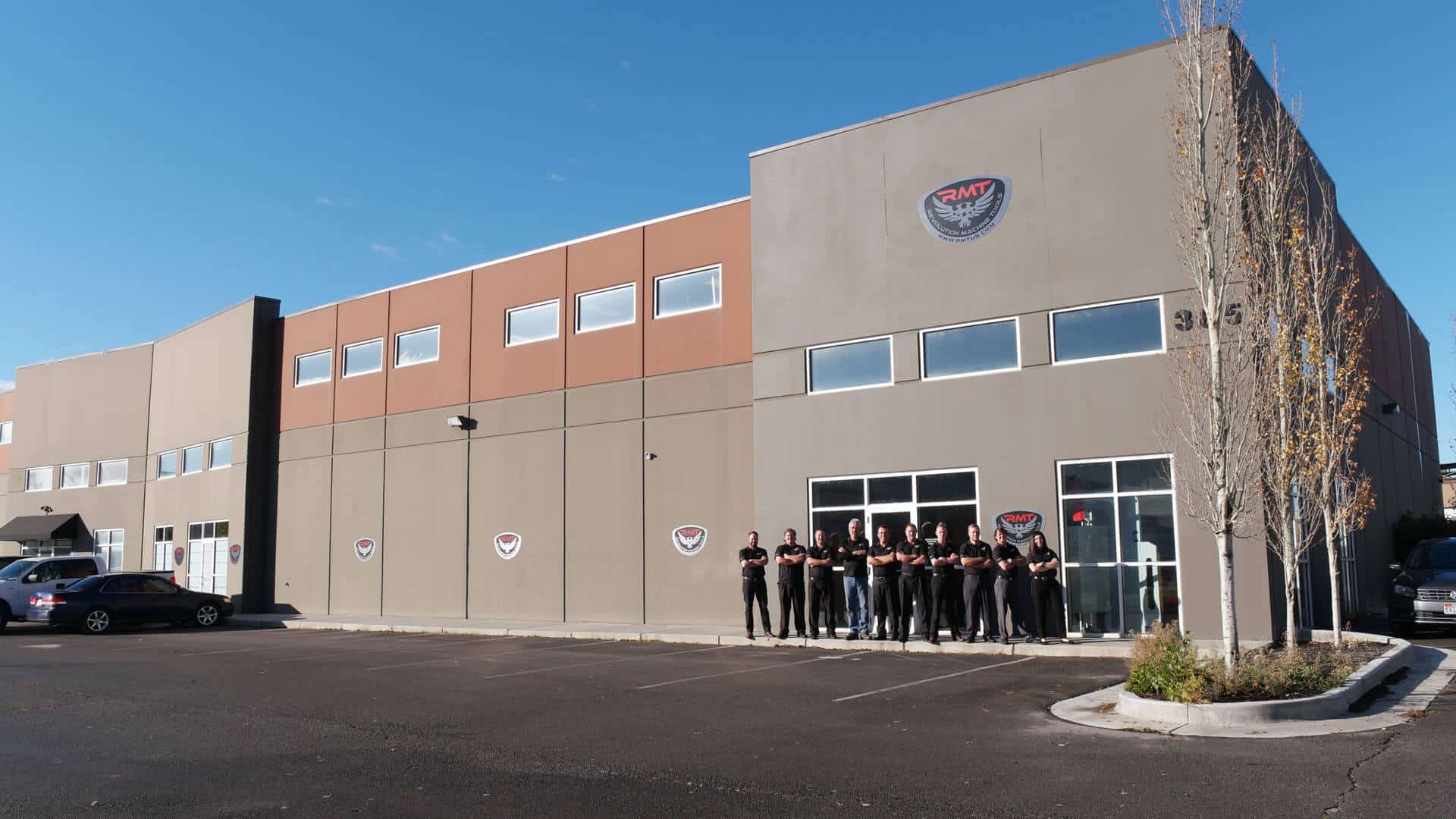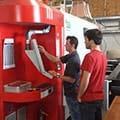Are you a small fabrication shop that needs more business? Do you work for a fabricator but want to set off on your own? Are you a successful metalworking facility that wants to expand into new markets? There is always room for growth in the metal fabrication industry—it’s just a matter of finding the right strategies to help you succeed in your specific arena.
General Principles of Business Growth
No matter what stage you are at in building your metalworking business, there are some general principles you should follow to successfully expand and maintain your customer base.
Love what you do. You are starting or running your business because you love doing metal fabrication. Seriously, if you don’t love the work, you probably need to find a new industry. Let’s say, however, that you inherited the family business and you feel an obligation to keep it running.
If you don’t currently love fabrication, then learn to love it. In order to be truly successful, you have to develop and maintain a passion for making things out of metal and for solving problems for customers who need the skill sets that you and your staff can bring them. That spark will make the long hours pass quickly and the hardships more bearable, so always stay focused on it.
Make a business plan. No matter the size of the company, you need a business plan to start or grow a business. It doesn’t have to be fancy—and you don’t need to get an MBA degree first—you just need to write out a document that lists: 1) the goals you want to achieve with your company in the future; and 2) the strategies you can think of to make those goals happen. It’s that simple.
Then you revise and expand the plan regularly as new ideas or situations develop, making it as accurate and as detailed as you can. A business plan is more than a means of keeping you on track towards your objectives, it’s also a blueprint you present to others to convince them to fund, partner or work with you, so don’t neglect creating and updating it.
Know the market and competition. Does your local market have a need for the type of work you can offer? Who are you competing against in your area? What are they offering that you don’t or can’t? What can you offer that will make you stand out from the crowd? Being able to do a good job in fabrication isn’t reason enough to justify you in starting or staying in business where you are located—you have to have the confidence that your services will be in demand.
Just as there are only so many taco trucks one intersection can support, your particular metalworking service might be redundant or seldom sought after in the location where you’d like to be working. Offering new techniques or relocating a few miles away should be options always open for consideration.
Beginner Basics
If you are just starting up your own shop, the following are some simple but key considerations.
Why? Has running your own business always been your dream, or are you just sick of your boss? Would changing jobs be more practical? Are you starting a company out of spite or do you seek to improve the world? Your motivation for starting up your own fab shop will be a significant factor in determining whether it is a fly-by-night fantasy or a realistic and obtainable future.
What? You need to figure out just what type of business you want to build. Is it a welding shop? A full-scale fabrication operation? A big metalworking facility offering machining as well as fabrication? When you decide that, you also need to be sure to name your company accordingly: “Bob’s Quick Weld” might be a good name for a small mom and pop shop, but it likely wouldn’t work as well for a major manufacturing factory.
When? Would it be better to wait to launch off on your own until after you’ve built up more of a savings? Is there an urgent need in the market now for what you can offer? Will there be family issues or other problems that could be avoided by either postponing or moving up your timetable? Make sure the timing is right before you plunge into the world of business ownership.
Where? You will have to conduct a little market research to see if your idea can blossom into a successful enterprise in the area where you intend to run it. Is there a customer base in place that can support you? Will there be enough business to go around that you can make a living there among similar shops? You have to be fairly certain you will be able to find a competitive advantage for starting up your type of business in the location you are seeking.
Who? Will you be a one-man shop? Just you and your wife? Maybe you, your brother and a cousin who’s been down on his luck? The size and composition of your staff is a very important consideration affecting everything from payroll to insurance to vacation time. You might find a technical college that is willing to partner with you for internships for their students who want to learn the trade. Carefully look over all factors related to personnel before you start and be sure have contingency plans in place should you find you have to expand or shrink your staff size from what you originally anticipated.
How? Along with a business plan, you will need to obtain funding for your business, as well as some legal advice. Working on your own can bring a bigger paycheck, but it also brings greater uncertainty and larger headaches that you never had to worry about when you were punching a timeclock. From taxes and loans to licenses and liabilities, there is a steep learning curve for the first-time business owner, so talk to trusted advisers who can help you each step of the way as you set up shop.
Grow Your Business
Once your business is a going concern, there are many different ways you can work to expand it.
Make and follow a budget. Overextending to buy the fanciest fabrication machines when you don’t have the budget for it is a quick recipe for disaster. Make sure your budget is a part of your business plan and follow it. Outsource work until you have saved enough for the right equipment to do it yourself. Having patience now will allow you to expand your business when it’s prudent to do so.
Separate your finances. Even if you are just a one-man shop, make sure that you protect your personal assets by creating a separate business bank account (and credit card). Besides making it easier to file your taxes, you will also be building your company’s credit history. This will help get higher lines of credit and better interest rates later when you want to do more with your business.
Network. Networking is a critical component of modern professional life, especially among small businesses. Through networking you can learn techniques from others in the industry. You can work with mentors who can help you build your business model. You can share resources and leads with another shop you’d normally compete with and do so in a way that benefits you both (such as lending employees to each other when one of you is in a crunch and the other is in a slow period).
Learn marketing. There’s no two ways about it—in this modern age, you’ve got to advertise. A listing in the Yellow Pages isn’t how fabrication shops are found by customers any longer. As a business owner you should learn the basics of marketing and then probably hire someone to run your digital and print marketing for you. If you aren’t large enough to have a fulltime or parttime staffer in place for this then look for an independent contractor who can do this for you a few hours at a time for a reasonable price. Make sure you require them to supply you with all login information and passwords for the accounts that are used—you don’t want to be locked out of your own website should you part ways with them.
Expand into new channels. You might think that once you’ve built a website you’ve done all the marketing that’s necessary. Realistically, you’ve just scratched the surface. You need to find ways of engaging customers and bringing them to your website so they can see what you have to offer. And you need to make sure that your website is designed in such a way that once customers arrive, they are motivated to contact you. Blogs, testimonials and a portfolio of significant jobs should be things you consider for your site. Using social media can create a presence for your company among interested parties and generate a positive impression of your services and staff. Videos posted online can showcase your work. There are many different digital avenues available to promote your business—take the time to explore them and see what works for you.
Be more outgoing. No customer wants to get a bid from someone with a reputation in the industry of being difficult to get along with. You, your fab staff, office workers and especially any salespeople need to be cheerful, outgoing and enjoy dealing with people—or at least present yourselves that way. Customers give their business to people they like, and they will recommend those companies to friends and acquaintances.
Go door to door. If you don’t have a sales staff out calling on current and potential customers, don’t be afraid to do so yourself. Drop off a box of doughnuts to a recurring customer, pass out business cards to prospective businesses in an area you are working in, cold call a large business you’d love to have a service contract with and get acquainted with the management. The more that people get to know you, the more they are likely to think of you when the time comes that they need services you can provide.
Constantly train. There are always new technologies and new techniques to learn. From watching free online videos to sending your fabricators off to a multi-day training course, there are learning experiences that will fit your budget to keep your company’s competitive edge sharp and your services in demand.
Specialize (but still be general). You likely have a lot of competition in your region, but if you can find a specialized area that your shop has expertise in, you can enlarge your customer base as news of it spreads, both through advertising and word-of-mouth. For example, if you can offer mobile welding services, especially including afterhours emergency work, you could open yourself up for much more business.
On the other hand, unless you are overloaded with work, you will want to appeal to as broad an audience as possible. If you are known as a welding shop, but you also can offer fabrication services for most types of jobs, then you will want to advertise that. (You may even want to expand your company name to reflect the additional services, such as changing from Ace Welding to Ace Welding and Fabrication.)
Conquer New Markets
Even if you are a large and successful fabrication business there are ways increase your market share in the industry.
Examine your target customers. The best clients are those with ongoing fabrication needs. You may get a sizeable business from customers needing one-off jobs, but steady work will come from large commercial facilities who are constantly in need of repairs and upgrades to their machines. If your current customer list doesn’t include these, then start to target them through marketing and sales efforts. (Just be sure to keep your current customers happy in the meantime—you’ll always need work from the little guys should your big clients pause or end their relationship with you.)
Extend to other metals. Work mostly with mild steel? Add stainless and galvanized. Start working with aluminum. Move out to copper and brass. There are different techniques to fabricating and welding different materials, so learn them and begin to buy the right equipment to process them. Gain a knowledge and mastery of metallurgy and work to become the go-to facility for fabricating specialty metals.
Enlarge to bigger projects. Are you only working in sheet metal now? Start saving for machines that can fabricate plate. Do you have to turn away some jobs because your press brake is two feet too short? Plan to buy a much bigger one and solicit even bigger projects. Are you an expert at drilling or bending small I-beams? Invest in a large beam drill or huge profile roll to handle the big stuff. There is always a large amount of steelwork needed in the construction industry. The larger the projects your facility can handle, the more potential work will become available for you to bid.
Expand to manufacturing. You are fixing equipment and building projects for others—why not fabricate a product yourself? There are likely many commodities that you could develop that would be perfect for your skill set and machine capabilities. Working in aluminum welding? Start building aluminum boats on the side. Even if you are just welding sculptures out of scrap metal, there are things you can build and sell for extra income, and you might create a whole new direction for your career.
Embrace new technology. Have you moved from manual to CNC for your big machines? Do you have a fiber laser on your production floor? How about a metal 3D printer for making parts from scratch? There are always new technologies being developed in the metalworking field, so stay informed and be willing to budget for the latest cutting-edge toys that your facility can implement in a practical and profitable way.
Explore niche markets. Love welding? Love deep see diving? Ever considered offering an underwater welding service? You might find you have limited competition for such an enterprise. A niche fabrication market is any specialized subsection of the larger metalworking market. By focusing your efforts to become a well-known player in one or two niche markets could greatly leverage your shop’s influence in a very competitive field.
Consult the Pros
There are many ways to grow your business. Take a look at what your competitors are doing and try some of that yourself. Also be sure to observe carefully what they aren’t offering and give some of those services a try and see if your market will support them.
Wherever you are at in starting and growing your business, always consult trusted individuals who have knowledge of the industry and a desire to help you succeed. They will be able to offer perspectives you might have overlooked, as well as insights tailored to your circumstances. The machinery consultants at Revolution Machine Tools weren’t hired just to turn a quick buck—their ongoing success depends on their customers’ success. Please give RMT a call when you are ready to advance your business and let our experienced staff weigh in on custom strategies for your specific situation that can help guide your growth profitably and successfully.






